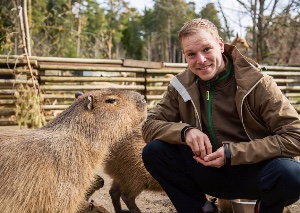Discussing Motivation
We all have moments where we want to learn something new, but where does our desire to learn come from?
It’s certainly true that we retain more knowledge when learning about a subject that interests us in a positive way. It’s much harder to remain attentive and absorb information that is not the least bit interesting to us.
I really enjoyed going to school, both for learning and other social reasons. As zookeepers, many of us look deep into literature that interests us just to learn more about specific subject matter. We conduct our research from various literature, which helps us get an even better understanding of our animals.
Having a strong drive to learn is present, but from where? Perhaps the drive comes from striving for recognition for our knowledge or becoming better at our jobs. Becoming better and better at our work gives us the ability to perform in the best interest of our animals at all times.
In my time, I have experienced animals who possess the inherent desire to learn, without the connection to other reinforcements. While we teach animals so many things and they in turn teach us about them, some are intrinsically motivated, finding the reward in the learning task itself.
During recent travel to Amsterdam, I read a book authored by Daniel H. Pink titled Drive that explores deeply into what motivates us. The text began with a very interesting research story, which immediately redirected my thoughts to animal training. If we view motivation differently, perhaps it may change the way we work with animals, solving some training issues we’ve experienced.
The question remains on my mind. Can learning itself be reinforcing enough?
The book discussed research concerning rhesus monkeys. Various puzzle boxes were made for the monkeys, allowing them to explore and figure out how to solve them. As the days passed, the monkeys continued to solve these puzzle boxes, but faster. There was no reinforcement at this time, like clapping, encouraging tones, or rewards, but the animals continued to solve the puzzles.
This book also outlined various levels of motivation. The researchers concluded that the rhesus monkeys continued to solve the puzzles without being externally reinforced because, “The performance of the task provided intrinsic reward.”
As trainers, we are picking up on what tends to make animals think and learn faster. Lets see how far we can go with challenging ourselves to train our animals in the best way possible by thinking around, and perhaps through, the box.

Peter Giljam
“Thinking Outside the Zoo”





0 Comments